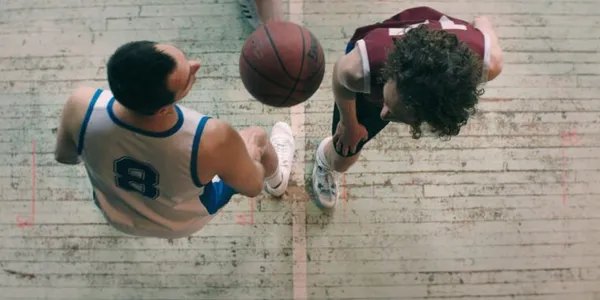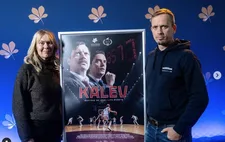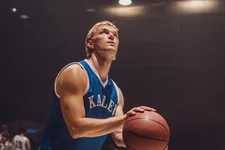 |
| Kalev. Pille Rünk: 'The choreography for the basketball sequences was planned very meticulously' Photo: Allfilm |
In 1991, a few months before the collapse of Soviet Bloc, a small Estonian basketball team became an unlikely champion of the whole Soviet Union. Kalev, directed by Ove Musting, fictionalises more than their ascent to victory. It is just as interested in the aggressive negativity of the public and the press over the team's decision to play in a league dominated by numerous other Soviet teams. Estonia had already declared independence. Instead of focusing on the classic heroes, the film tries to pay attention to all the ways basketball impacted the daily lives of the nation – its social, political, and personal importance. We talked to Musting and the producer Pille Rünk about the personal, political, and practical intricacies of making this enjoyable and technically complex film.
Your film represents real events. What is your personal connection to this story?
Ove Musting: I remember the overall feeling about it. I was in a geography lesson when I heard that tanks attacked Vilnius. It was quite emotional. I was 14 years old then and now, on February 24, I felt the same goosebumps as 31 years ago. Also my grandparents ran away twice from deportation and still tell stories about that. It is something you never forget. It seems to me like some trauma that we pass on from generation to generation. There was the Second World War, then the collapse of the eastern bloc and now the war in Ukraine.
You chose Ove to direct this film. How did you decide on collaborating with him?
PR: It was a very challenging project. A tiny country with very little money making a technically complex project. So, I had to find a director who is up to the challenge, who is not afraid, a director with a certain kind of passion. Ove has experience in multi-camera work and big events, but he also has a great sense of space. This is what the film needed, apart from the drama – for the games to be put into a certain form that is believable.
How did you go about recreating Estonia of the early nineties in terms of locations, costumes, colours, etc?
OM: I was born in 1977 and I remember the Nineties. For me as a teenager, it was an awful time. For some people, it was probably a wonderful time, but in southern Estonia where I came from, the Nineties were a big mess. With the production designer, we tried to get the feeling of the time and make sure that every scene obviously transports the viewer into the early Nineties.
PR: The choreography for the basketball sequences, for example, was planned very meticulously with every move of the camera and of the actors practiced in advance.
OM: For those sequences we worked with Aivar Kuusmaa, who is now working as head coach. He prepared some basketball plays and I tried to figure out what the best camera angles and movements would be. I was very impressed by the opening sequence of Saving Private Ryan with the gates of the boats opening. I wanted to recreate the intensity of that sequence in a game of basketball since basketball is also a battle.
Why was it important for you to include the story of Gert Kullamäe, the player that is always told he is going to get his chance but ends up sitting on the bench the whole film?
OM:I didn’t want to make a one-sided hero film. Instead of other more famous players and coaches, I was interested in Aivar Kuusmaa, who was in conflict with the coach all the time, for example. Similarly, Gert represents the people that we never talk about. I wanted to show the life of this whole team. The life of a player that might wait for ten games before he plays.
How important was it for you to stick to real events and what could you make up?
OM:I was happy I made this film in Estonia because I didn’t have to make it bigger and more dramatic. But it is a fiction film, not a documentary, so I had to make almost all the stories up.
How has the film been received?
OM:I was afraid the journalist in Estonia might be critical of the film because it is critical of them. But for now, the reception has been very positive. The audience likes it, the critics like it.























